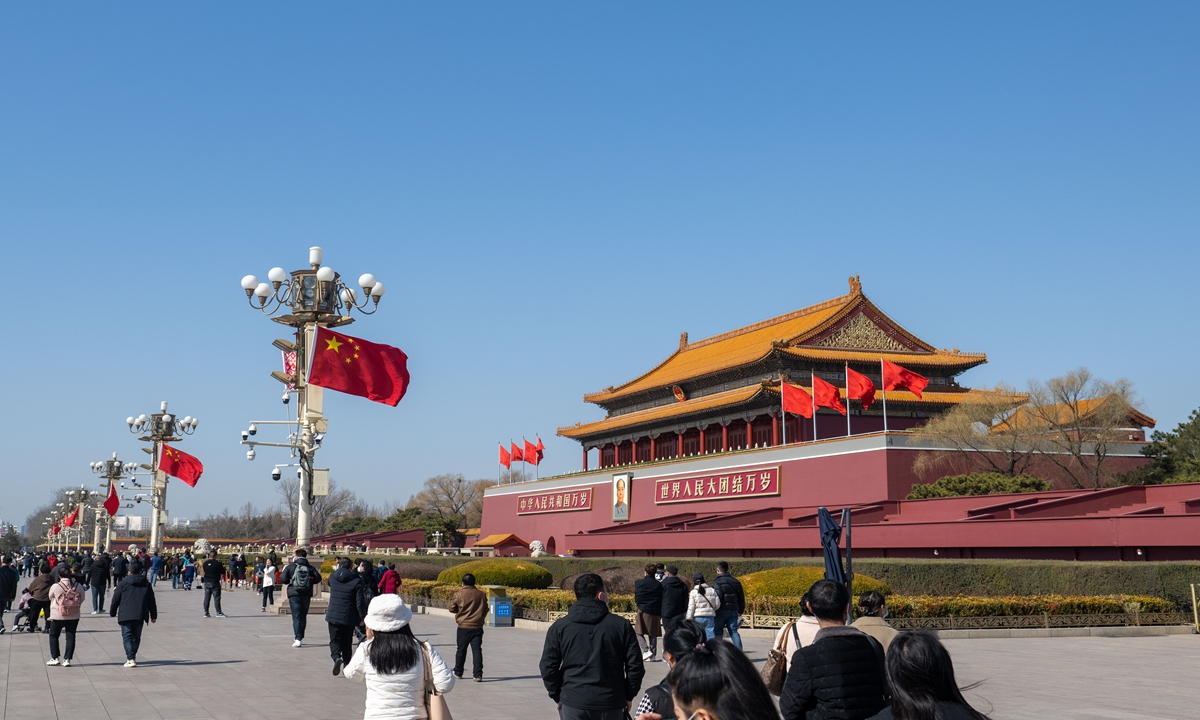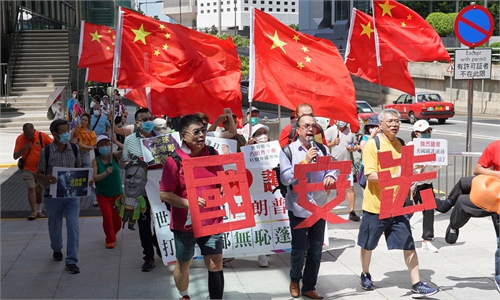
Flags flutter in the wind at Tian 'anmen Square ahead of the two sessions in Beijing, March 2, 2023. Photo: VCG
China has accelerated legislation relating to national security, and has for the past few years improved the legal system for opposing foreign sanctions, interference, and long-arm jurisdiction, and provided legal protection for the interests of our country and our people, said China's top legislator.
The primary tasks in the top legislature's diplomatic work should among other things step up efforts to conduct legal, political and diplomatic struggle when needed to defend China's sovereignty, security and development interests, the top legislator said.
Experts said the trend reflects that China's policymaking on foreign affairs will be more law-based to better coordinate domestic laws with international law as it meets more hostility from Western countries.
Li Zhanshu, Chairman of the Standing Committee of the National People's Congress (NPC), delivered a report on the work of the Standing Committee of the NPC on Tuesday. During the speech, Li said that the legislator stepped up legislation in foreign-related fields in the past years, including enacting the Law on Countering Foreign Sanctions and the Export Control Law. It has also deliberated draft laws on foreign relations and foreign state immunity.
With these efforts, we improved the legal system for opposing foreign sanctions, interference, and long-arm jurisdiction and provided legal protection for the interests of our country and our people, Li said.
He said that the primary tasks of the NPC's diplomatic work are focusing on the country's overall diplomatic agenda and stepping up to the front lines of any legal, political or diplomatic struggle whenever the country requires.
Faced with some countries, especially the US, launching a reckless crackdown and slapping of sanctions on China, the NPC has played an important role in response to those sanctions and crackdown measures in the past few years, and there will be more, Zhang Shuhua, director of the institute of political sciences at the Chinese Academy of Social Sciences, told the Global Times.
Not only countering the US' provocative measures, China needs to make certain legislation and take precautions as Washington is capable of playing any card, according to Zhang.
In a press conference held on Saturday, Wang Chao, spokesperson for the first session of the 14th NPC said that the NPC Standing Committee has initiated legislation plans, with this year's agenda to focus on legislation in key, emerging fields and foreign-related fields.
Li Haidong, a professor at the Institute of International Relations at the China Foreign Affairs University, told the Global Times that the legislation agenda reflects that China's policymaking on foreign affairs will be more law-based to better coordinate domestic laws with international law. These laws will serve as the legal guarantee in handling foreign-related affairs.
Some Western voices said China's recent legislation in foreign-related fields shows that China's diplomacy will be "more aggressive." Li said the accusation is totally nonsense and ridiculous.
"It is US diplomacy and foreign actions that are getting increasingly ruthless and shameless, as Washington continually imposes 'long-arm jurisdiction' and unilateral sanctions to unfairly crack down on other countries' companies and even force its allies to arrest other countries' personnel without legal basis, he said, noting US aggression will inevitably meet with countermeasures.
Zhang added that apart from foreign countries, the legislation on China's special administrative regions is also applaudable, and offers government legal guardrails to safeguard national safety.
Li also addressed the adoption of the national security law for Hong Kong and a decision on improving Hong Kong's electoral system. "In adopting the legislation and decisions concerning the special administrative regions, we fully implemented the policy of One Country, Two Systems, under which the people of Hong Kong administer Hong Kong and the people of Macao administer Macao, both with a high degree of autonomy," Li said.

